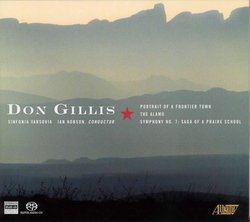Gillis's Paean to the State of Texas
J Scott Morrison | Middlebury VT, USA | 05/08/2006
(5 out of 5 stars)
"Don Gillis (1912-1978) was a Missourian transplanted early to Texas. He graduated from Texas Christian University and always identified himself as a Texan through and through, even when he was working in the 1940s as an arranger and producer for Toscanini and the NBC Symphony in New York. Much of his output of symphonic music has Texas and its people as impetus. That is certainly true of this release. All three pieces here were written with specific Texas places and institutions in mind. They were written in 1947-1949 (although the 'Ranch House Party' section of the first work was probably written in 1940, thus predating Copland's similar 'Hoedown' from the 'Rodeo' ballet).
This is one of a continuing series devoted to much of Gillis's orchestral output, and much of it is unexpectedly played by a Polish orchestra, the Sinfonia Varsovia, conducted by a British pianist/conductor, Ian Hobson. Yet, they get it just right. It is hard to imagine better, more idiomatic performances than these. The three works here celebrate two Texas cities; 'Portrait of a Frontier Town' and 'Symphony No. 7: Saga of a Prairie School' are inspired by Fort Worth, Gillis's hometown; and 'The Alamo', of course, was inspired by that fabled Texas fort (and icon) in San Antonio.
'Frontier Town' is in five movements -- fast, slow, fast, slow, fast -- and they paint both the frontier spirit still found in Fort Worth, and that specifically post-war, mid-century optimism and can-do-ism of the late 1940s. Gillis's music, as always, is immediately accessible, masterfully orchestrated, leavened with musical wit and high spirits. In the two slow movements ('Where the West Begins' and 'Prairie Sunset') there are evocations of the far horizons of the big sky, the subtle semi-desert colors, the loneliness of the prairie.
'Alamo' is a serious piece describing, with suppressed emotion, the tragedy and glory of the Alamo massacre, so important to Texas's psychology. It is courageous, somber, almost religious music but it does not wear its heart on its sleeve -- there are high spirits as well; one must look beneath the exterior to gain an understanding of Gillis's identification with the scene. A very effective work.
The Symphony No. 7 was written for the celebration of the 75th anniversary of Texas Christian University, the Fort Worth school from which Gillis graduated. It was also the occasion of Gillis receiving an honorary doctorate from his alma mater. Unlike some occasional pieces, though, the symphony is a major statement. It is filled with celebration, reverence and affection. It is a half-hour work in the usual four movements played without pause. One of the germinal themes is a familiar Protestant hymn (I've racked my brain and cannot identify it, darn it -- Later: it just came to me: 'Come, Thou Fount of Every Blessing'). There are also cowboy hoedown rhythms -- never absent for long in a Gillis work -- and several brash themes typical of Gillis in his populist mode. The whole thing hangs together, conjuring up the affection for the past and the optimism for the future that was surely in evidence in Fort Worth and at TCU during that era, and it builds to a satisfying climax in the final section subtitled 'The Fulfillment.' Sinfonia Varsovia really shine here.
This appears to be the first in the Gillis series recorded and issued in hybrid SACD, playable both on SACD multi-channel playback equipment as well as on plain-vanilla CD equipment. I listened only to the CD layer, but was blown away by the sonics. I can only imagine how spectacular the SACD layer must be.
Bottom line: This is another in this valuable, endearing series of Gillis recordings for which we must thank the Albany label.
Scott Morrison"


 Track Listings (3) - Disc #1
Track Listings (3) - Disc #1



